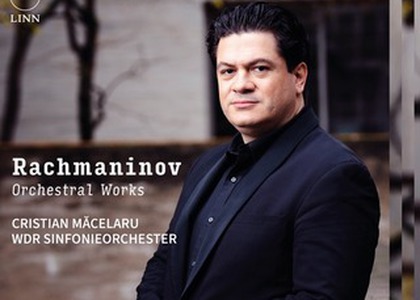Disk of 2024

Conductor Cristian Măcelaru and the WDR Orchestra of Köln. Pieces by Sergei Rachmaninoff (I, II) – CD Review, 16th, 17th of August 2025
Conductor Cristian Măcelaru and the WDR Orchestra of Köln. Pieces by Sergei Rachmaninoff (I, II) - CD Review, 16th, 17th of August 2025
An album by Romanian conductor Cristian Măcelaru: symphonic works recorded with the WDR Orchestra of Köln, from an album released by the British record label "Linn" on February 28th 2025.
As the chief conductor of the WDR German Radio Orchestra of Köln, Cristian Măcelaru focused on creating multiple studio recordings, of course, for a radio orchestra. Once the 2024-2025 season was over, his chief conductor contract with this orchestra ended, but they continue collaborating. Măcelaru is the main guest conductor and will focus on recordings.
For the British "Linn" label, aside from the Rachmaninoff album, Măcelaru and the WDR Orchestra recorded three other CDs, which include Johannes Brahms's piano and orchestra concertos, with Simon Trpceski as soloist, and symphonic works by Bartok and Dvorak. For other labels, three other albums by Măcelaru and the WDR Orchestra were released.
It's a fruitful endeavor which was noticed by international critics and all of the albums received laudatory reviews and nominations for important awards, such as the International Classical Music Awards.
We'll be listening to the Rachmaninoff albums, starting with the Russian composer's Symphony No. 1, a piece he composed in his youth, back in 1895. It was so poorly received when it premiered that it took Rachmaninoff another 3 years to gather the courage to write another piece. It was an unfair situation for an opus where we can already recognize the composer's style and an extraordinary melodic inspiration.
In 1908, Sergei Rachmaninoff wrote the symphonic poem "The Isle of the Dead", which was inspired by a black and white photo reproducing one of the paintings of the same name by Swiss Symbolist painter Arnold Böcklin. It's a piece that emphasizes the somber atmosphere, the waves crashing against the rocky island, as well as an inner tension, which are admirably created by the WDR Orchestra and its conductor, Cristian Măcelaru.
The Rachmaninoff album is the first of a series dedicated to all of the Russian composer's symphonic works. It's an album that already received international rave reviews. Here's what the critics at Preis der Deutschen Schallplattenkritik have to say: "Cristian Măcelaru welcomes us into the universe of Rachmaninoff's symphonic works without relying on kitsch or glamour. In spite of this, his phrasing is rich in sensibility and his rubato is generous. The orchestra's performers bring to the table a fine expression and wonderful timbres. The WDR Orchestra is in top shape and it achieves a rich, multifaceted sound, which is brought out by an excellent recording technique."
There are words that expertly describe the performance of Rachmaninoff's last symphony, the Symphony No. 3 from 1936, in a style that remains Romantic, but adds to it the experience of Modernism.
BBC Radio 3: "There is so much feeling of dance and attention to detail in the new recording! It's brilliant!"
Music Web International: "Under the baton of Cristian Măcelaru, the orchestra the orchestra puts its entire organism into motion. This, together with the excellent recording, made me admire the entire performance very much."
There are words that fit this album's performance of Sergei Rachmaninoff's Symphony No. 2, a piece of a considerable length that has been Rachmaninoff's most successful symphony since its premiere in 1908. It's an opus that best represents Rachmaninoff the composer: through its structure, ideas and melodicism.
As I believe that music is given meaning through a direct connection to our everyday experiences, I'm going to tell you how I experienced this recording for the first time: with my earbuds in, coming back from Valea Oltului on a sunny summer day, looking at the lush greenery and associating every sound with the vibrant nature that makes us feel fulfilled. And I realized that each of Cristian Măcelaru's recordings bears his distinct signature, which is unusual for a conductor. Because, listening to this recording, you can imagine him, with a very animated body language, bringing it all together alongside the orchestra that follows him, inspired by his presence, paying attention to every detail, having the exceedingly rare capacity to build amelodic line for the string section that makes it seem as if a human voice were singing, attacking in precise points, letting each note develop naturally.
Yes, without kitsch and without glamour, music in its truest form, music that changes our life.
It's part of an ambitious project focusing on recording all of Sergei Rachmaninoff's symphonic works. The album also proposes an opus that is less known: Caprice bohémien Op. 12, written in 1894 by a 21 year old Rachmaninoff, only one year before the premiere of the Symphony No. 1.














